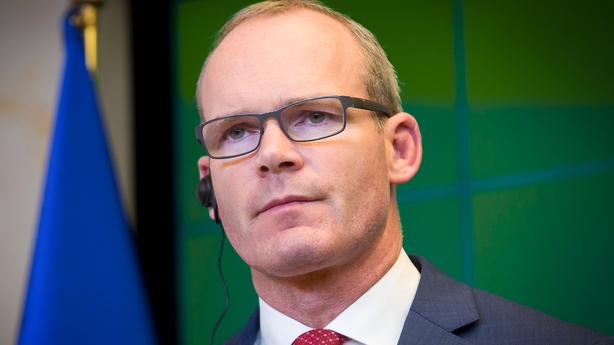The Minister for Foreign Affairs has said that he will be discussing the size of the Russia's diplomatic mission in Dublin with the three leaders of the parties in Government "in the coming week or so".
Speaking in Dublin Castle Simon Coveney said that Ireland had "already asked a number of members of the Russian Embassy team here to leave".
"Whether we act further on that is really a matter that that I'll discuss with the party leaders in the in the coming week or so," Mr Coveney said.
He added that there has been "ongoing consideration in relation to the appropriate level of diplomatic representation here in Dublin," saying it was "not necessarily connected to what we've seen this week, in terms of the sanctioning of individual politicians in Ireland".
Mr Coveney said that there is currently around 25 people in the Russian Embassy at the moment and that he has been receiving advice from An Garda Siochana, from the Defence Forces and from various intelligence sources "in terms of who's here and who's known in terms of diplomats or others who may be here who aren't involved in diplomatic work".
Speaking earlier on RTÉ’s Morning Ireland, Mr Coveney said that Russia's move to ban 52 Irish officials is a very "unwelcome distraction" and an effort to unsettle Ireland and its political system.
He said Ireland "should not play this game".
"We should focus on where the real war is which is in Ukraine where Russia is clearly responsible for war crimes."
He said none of the 52 people who are subject to this travel ban are planning to travel to Russia anytime soon.
Mr Coveney would not be drawn on who is on the list, but said the politicians are predominantly from Fine Gael, Fianna Fail and some Independents and one or two other party representatives and it does not cover all political parties.

He said he does not "want to insinuate anything" from who is on the list and who is not.
Ukrainian President Volodymyr Zelensky has said Russia's decision to ban Irish officials from their country is propaganda that "doesn't really affect anything".
Speaking through a translator in an address to DCU students this lunchtime, Mr Zelensky said that the move was due to Ireland's decision to support European effort to stop what he described as Russia's "terror".
A meeting was yesterday held with Russian ambassador Yury Filatov and Deputy Secretary General of the Department of Foreign Affairs Sonja Hyland, where it was conveyed to him that Russia's behaviour was "absolutely unacceptable".
Minister for Overseas Development Aid and Diaspora Colm Brophy has said Russia's list of sanctions and the Russian government’s overall behaviour is "a distraction" designed to keep people from talking about "their barbaric actions".
Speaking on RTÉ’s Today with Claire Byrne, Minister Brophy said the focus should be on the fact that Russia has been targeting Ukraine’s infrastructure to leave people without power this winter.
"So that’s where our focus should be and that’s where the focus of the Government is and we’ll continue to keep that pressure on Russia," he said.
The minister said throwing out the Russian Ambassador would be "a simple solution that for one day you might feel good about yourself" but that Ireland’s Ambassador could then be expelled.
He said there are "real life issues" where a level of contact needs to be maintained.
There have been several calls to expel the Russian ambassador, including from some within the Government ranks.
On the same programme, Sinn Féin TD for Donegal Pádraig Mac Lochlainn said he thinks the Russian ambassador to Ireland should have been expelled a long time ago.
He said the ambassador gave testimony to the Oireachtas that was "utterly false" and that the invasion of Ukraine and the Russian oppression on Ukrainians is "reprehensible".
"I think it would send a very strong signal if we sent the Russian ambassador packing," he added.
Declaration on explosive weapons in populated areas
Mr Coveney's comments come as a declaration is set to be signed today in Dublin Castle by up to 80 countries calling for more focus on use of explosive weapons in populated areas.
"This morning, up to 10 million people have no power and many of them no water in Ukraine today, a country that is now starting to see snow falling and so we have parents trying to figure out how they're going to heat their children," the minister said.
"This is the human consequence of a war of aggression that is now targeting civilian infrastructure and civilians that we are trying to call out."
He said that Ireland effectively signed up to be the champion to try and lead on the explosive weapons and, last summer in Geneva, managed to get a declaration agreed, working with the International Committee for the Red Cross, which is now leading to the conference and Dublin declaration.
Meanwhile, Ukrainian President Volodymyr Zelensky is to address Irish university students at an event at Dublin City University this afternoo.






